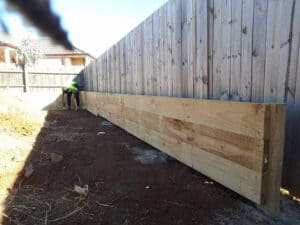Introduction
Fencing is more than just a border; it's a statement of security, style, and privacy. Nevertheless, before you jump into the amazing world of fencing, it's essential to make sure that your brand-new installation abide by regional policies. Whether you're thinking about a sleek picket fence or a durable timber barrier, understanding the legal landscape can be daunting. That's where the know-how of fence contractors can be found in. In this thorough guide, we will check out how to ensure your fence satisfies regional policies with aid from specialists, equipping you with all the knowledge you need to make informed decisions.
Understanding Regional Regulations for Fencing
What Are Regional Fencing Regulations?
Local fencing policies are rules and guidelines set by local authorities regarding the building and placement of fences. They differ extensively based on location and can determine everything from height limitations to products used.
Why Are Local Fencing Laws Important?
These regulations are essential for numerous reasons:
- Safety: Ensuring that fences do not block visibility at intersections. Aesthetics: Preserving a consistent appearance within neighborhoods. Property Rights: Avoiding disagreements in between next-door neighbors regarding residential or commercial property lines.
Common Kinds of Fencing Regulations
Height Restrictions Material Specifications Setback Requirements Design GuidelinesHow to Guarantee Your Fence Fulfills Regional Laws with Assistance from Contractors
When embarking on your fencing job, partnering with experienced fence contractors is invaluable. Here's how they can help:
1. Understanding of Regional Laws
Most skilled fencing contractors, particularly those familiar with specific areas like Melbourne, have an intimate understanding of regional laws governing fencing.
2. Website Assessment
Before beginning any job, these professionals will evaluate your website to make sure that your planned fence is certified with all regulations.
3. Permitting Process
Many locations need licenses for fence setups. Your professional will assist you through acquiring the essential licenses and paperwork.
4. Material Selection Guidance
Different materials may be based on various guidelines; your specialist will help you choose compliant products while still meeting your aesthetic desires.
Choosing the Right Fence Contractor
What Needs to You Look For in a Fence Contractor?
When choosing a professional, think about:
- Experience in local projects. Positive consumer reviews. A portfolio showcasing their work.
Questions to Ask Potential Contractors
How long have you been in business? Do you have experience with my type of fencing? Can you provide references? What warranties do you offer?Types of Fences That Meet Resident Regulations
Wooden Fences
Wooden fences are popular due to their classic appeal however check if there are material limitations in your area.
Pros:
- Versatile style options. Natural visual appeal.
Cons:
- Requires upkeep over time.
Vinyl Fences
Vinyl uses toughness and low upkeep but may have particular height restrictions in some locales.
Pros:
- Long-lasting. Variety of colors and styles.
Cons:
- Higher preliminary cost compared to wood.
Chain-Link Fences
These fences are frequently preferred for security purposes however may not satisfy aesthetic requirements in property neighborhoods.
Pros:
- Cost-effective.
Cons:
- Less aesthetically attractive than other options.
The Significance of Authorization Acquisition
What Is a Fence Permit?
A fence permit is main approval from local authorities enabling you to build or modify a fence on your property.
Why Do You Required a Permit?
Permits make sure compliance with zoning laws and prevent possible disputes with neighbors or regional authorities down the line.
Understanding Setback Requirements
Setback requirements dictate how far back from residential or commercial property lines structures-- consisting of fences-- should be built.
How Do Setbacks Vary?
Setbacks can vary based upon:
Residential vs Industrial Zones Type of Road Adjacent Height of the FenceWorking With Your Neighbors: The Collective Approach
Building a fence isn't practically your property; it has to do with maintaining great relationships with neighbors too!

Why Interact With Neighbors?
Not only does this prevent disagreements, however it also fosters goodwill within the community-- after all, nobody desires an angry neighbor!
The Function of Surveyors in Fence Installation
Having accurate residential or commercial property lines is crucial for any fencing project.
What Can Surveyors Provide?
Surveyors can validate property limits and help avoid future conflicts that arise from improperly placed fences.
Finalizing Your Design Strategies Before Installation
Once you've browsed through approvals and permits, it's time to finalize your style plans!

Key Considerations:
Aesthetic Appeal Functional Requirements (e.g., personal privacy vs exposure) Compliance with regional lawsInstallation Process: What To Expect From Your Contractor
Your specialist will handle every aspect of installation-- from digging post holes to securing panels-- making it seamless for you!
Typical Steps Include:
Site Preparation Material Gathering Installation Day ExecutionPost-Installation Examinations and Compliance Checks
After setup, some areas need inspections by regional authorities to make sure compliance with previously released permits.
Maintenance Tips After Installation
Keeping your fence looking terrific includes routine maintenance! Here's what you'll require:

FAQs About Fencing Laws and Contractors
1) Do I constantly require an authorization for my fence?
Yes, the majority of areas need licenses unless specified otherwise by local laws.
2) Can I construct a tall fence around my yard?
Height limitations use depending on area; consult your contractor for guidance.
3) What if my neighbor disagrees with my planned fence?
Discussing strategies openly can frequently lead to amicable solutions.
4) Are there any specific products I should avoid?
Specific products might be forbidden; speak with skilled specialists familiar with Melbourne's regulations.
https://codyfence-installerefun322.timeforchangecounselling.com/navigating-local-ordinances-what-fencing-contractors-understand-about-permits
5) How do I select in between wood and vinyl?
Think about factors like budget, desired aesthetics, and upkeep choices when making this decision.
6) Can I install the fence myself instead?
While do it yourself is possible, working with specialists guarantees compliance and lessens possible headaches down the road!
Conclusion
Navigating through regional fencing regulations doesn't need to feel frustrating! With specialist assistance from qualified professionals like those found in Melbourne, attaining compliance ends up being an experience rather than a challenge course! So why wait? Start preparing today so you can enjoy that gorgeous new fence while staying on the best side of the law!